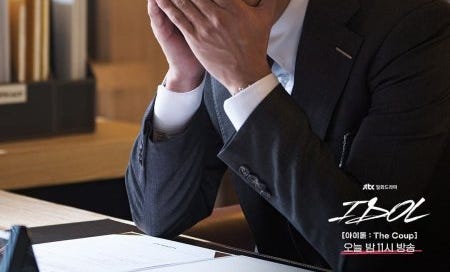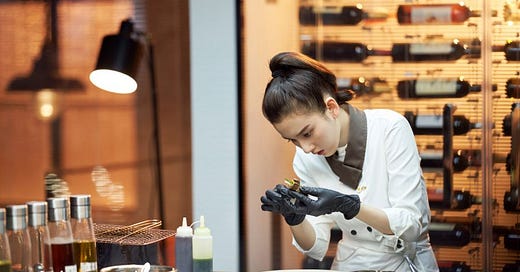
Idol: The Coup (2021) A rant of sorts
Contains spoilers…
What drives this post is not any particular fondness for the drama. I watched it. I fast-forwarded through parts (although less over time) and I finished it. I can even admit to enjoying parts of it immensely. But it’s not a drama that I would necessarily recommend heartily or at all. I’m not a fan of K pop (even though I had a tenuous relationship with it when my eldest was at her most fanatical) much less the rather dysfunctional industry that scaffolds its promulgation. No doubt Kwak Si-yang and Ahn Se-yang were the best in the terms of the acting. The rest? A rather mixed bag depending on the demands of the moment.
The post seemed like a good idea because the entire drama exemplifies a kind of trend in screen productions that I identified in Episode 9 of The Red Sleeve in my previous post. There’s a kind of infantilization of how serious issues are explored and/or resolved in the narrative. A reviewer from another platform called it “Disney solutions” which works for me too. In so saying, I no doubt reveal myself to be a fuddy duddy here but it’s all part of the brand that’s on offer. :D
At the end of the day I don’t know what Idol wants to be and that may be part of the problem. It’s not a bad show but it takes an odd kitchen sink approach which creates a feeling that it doesn’t know what it wants to say about much aside from friendship and teamwork maybe. To my mind the entire show suffers from a similar kind of identity crisis that plagues the characters particularly those from Cotton Candy. Is it a lightweight melodrama or a slice-of-life drama? Or an underdog fairytale? It tries to a bit of everything and this is where the signals get crossed, undermining what could have been a more coherent product. Much of the story sees the characters lurching from crisis to crisis, putting fires out. That’s the makjang trick of creating repeated conflict to keep audiences coming back for more even while these conflicts don’t require a great deal of effort to troubleshoot.
A bit of makjang is always par for the course in K dramas. I’ve largely gotten to used to seeing it even in crime shows. But in an extended makjang there are fairly earth-shattering consequences and the stakes are high. Often knots take time to untangle. The odd crisis has its place in the storytelling if it adds something substantial to the narrative and the messaging.
My problem though with the way Idol does it is how potential scandals are introduced and resolves them with what are essentially deus ex machinas. I don’t doubt that the K pop industry is riddled with issues and the show seems to have covered a gamut of them. Depending on who’s watching it, it might give the wrong impression about the K pop business. In a mere two final episodes the show throws up three seemingly serious “threats” and resolves them without batting an eyelash.
From all of that, I imagine that one half of the message is that there are obstacles to overcome to gain some measure of success in one’s chosen field but the other half seems to be that Cotton Candy don’t really have to make that many tough decisions to achieve their goals. Disbanding is not a bad idea of you’re stuck in a rut and going nowhere but watching the convoluted way in which Cotton Candy do it is exhausting to say the least. Why bother? To prove something I imagine. I’m surprised that CEO Cha Jae-hyuk hasn’t started to sprout white hairs trying clean up after everybody’s mess. One gets the feeling in the final phase that he does most of the heavy lifting possibly in the name of character development of which he has the lion’s share. He has feelings for Jenna and it turns him into a nicer happier guy. He’s been on Scrooge’s journey and now he’s certainly less grumpy about life and in all likelihood looks forward to spending Christmas with Jenna even if the show leaves that door completely open.
As for Cotton Candy, what have they learnt? Friendship is important for one. Which is probably the most anodyne thing to say about any drama. Maybe if I want to put more nuance to it, I could say having the right kind of friends makes all the difference in the world. What else might they have learnt from this? If you’re likeable you can get away with plenty. It’s not really about talent because talent is a dime a dozen. Likeability… that’s different. If you can make the right people like you, you can move mountains… maybe even God.
If you suspect a bit of snark in what my screed, I don’t deny it. It makes little sense why the show would introduce a pedophile predator wannabe director at the 11th hour only to send him to the nearest exit with a slap on the wrist. The man’s a criminal. Who cares if he loves his daughter and doesn’t want her to know about his ugly impulses? He shouldn’t just be a hoop for the team to jump through, he should be behind bars lest he gets ideas about laying his grubby hands on someone else. The resolution diminishes his crime and its only purpose is to be a learning/healing moment for one of the girls. Then just before a big event, someone’s grandma goes into a coma so five becomes four. But wait, just as everyone’s on edge wondering what to do, grandma wakes up in time to say to the prodigal to “go”.
Like I said, deus ex machina. Or as others have said, a Disney ending.
That’s just one example. There are a lot of people doing bad things in public view but in the end they all hold hands and sing kumbaya together.
Call me grumpy or what you may, but the way the show does character development really leaves me scratching my head. To me it would have been actual character growth if grandma never woke up and Hyun-ji had to actually make an adult decision to say something like “I can’t let you all down. I think Grandma would want me to do this as well.” A bit cliche but at least more realistic. But no, Hyun-ji doesn’t really have to make any hard choices here.
The Cotton Candy crew just seem to be incredibly lucky that they are surrounded by the right kind of soft-hearted human beings even in such a reputedly cut-throat business.
I remember hearing the story of when Fred Astaire (Hollywood actor, dancer extraordinaire) lost his wife but was committed to doing Daddy Long Legs I think it was. I don’t think anyone would know just watching him onscreen that he was grieving because the man was a professional through and through. I also heard that during breaks he would go off to the side and have a bit of a cry. Yeah, I know, the world’s changed a lot since then… not all for the best quite frankly.
All of us enjoy a bit of escapism but if the writing brings this much (negative) attention to itself, there has to be something wrong with the approach. When I think about how well-written Racket Boys was overall and it was a feel-good underdog show that got it right, I wonder if it’s really that challenging to put together a cohesive script with very similar themes. Even if Idol: The Coup is meant to be some kind of escapism, it seems to be far too harrowing an experience for the cotton candy fluff solutions to be convincing.









